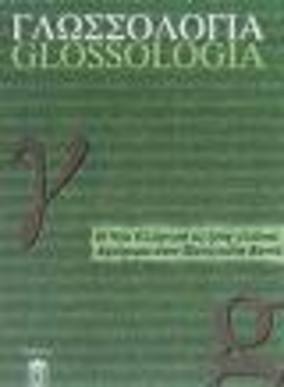Responding to thanks : Divergence between native speakers and FL learners of Greek and the consequences for establishing rapport
Part of : Γλωσσολογία ; Vol.24, 2016, pages 61-73
Issue:
Pages:
61-73
Author:
Abstract:
Η έρευνα που παρουσιάζεται στο άρθρο εξετάζει την παραγωγή της γλωσσικής πράξης της απάντησης σε ευχαριστία από φυσικούς ομιλητές της ελληνικής και μαθητές της ελληνικής ως ξένης γλώσσας. Τα δεδομένα προέρχονται από 100 φυσικούς ομιλητές και 100 μαθητές προχωρημένου επιπέδου και συλλέχθηκαν μέσω ερωτηματολογίου παραγωγής (discourse completion test), συνδυασμένου με λεκτικές αναφορές (verbal reports) των συμμετεχόντων. Από την ποιοτική και ποσοτική ανάλυση των αποτελεσμάτων προκύπτει ότι η παραγωγή των μαθητών διαφέρει σημαντικά από την αντίστοιχη των φυσικών ομιλητών, τόσο ως προς τα πραγματογλωσσικά μέσα που χρησιμοποιούν για να αποκριθούν σε μια ευχαριστία, όσο και ως προς την ικανότητά τους να χρησιμοποιήσουν τα μέσα αυτά με κοινωνιοπραγματολογικά κατάλληλο τρόπο. Η απόκλιση αυτή αποδίδεται σε έναν συνδυασμό παραγόντων, όπως η έλλειψη επαρκούς κοινωνιοπραγματολογικής γνώσης, η τάση για υπεργενίκευση συγκεκριμένων στρατηγικών και οι ανεπάρκειες που παρουσιάζουν τα διδακτικά εγχειρίδια.
Subject:
Subject (LC):
Keywords:
foreign language, interlanguage pragmatics, sociopragmatic competence, thanks
Notes:
Includes appendix with situations under examination
References (1):
- Aijmer, K. 1996. Conversational Routines in English: Convention and Creativity. London: Addison Wesley Longman.Bardovi-Harlig, K. 2001. Empirical evidence of the need for instruction in pragmatics. In K. Rose & G. Kasper (eds), Pragmatics in Language Teaching. New York: Cambridge University Press, 13-32.Beebe, L. & Cummings, M. 1996. Natural speech data versus written questionnaire data: How data collection method affects speech act performance. In S. Gass and J. Neu (eds), Speech Acts Across Cultures. Berlin: Mouton de Gruyter, 65-86.Bialystok, E. 1993. Symbolic representation and attentional control in pragmatic competence. In Kasper G., Blum-Kulka, S. (eds), Interlanguage Pragmatics. Oxford University Press, New York, 43-59.Billmyer, K. & Varghese, M. 2000. Investigating instrument-based pragmatic variability: Effects of enhancing discourse completion tests. Applied Linguistics 21, 517-552.Brown, P. & Levinson, S. 1987. Politeness: Some Universals in Language Usage. Cambridge: Cambridge University Press.Cohen, A. 1996. Developing the ability to perform speech acts. Studies in Second Language Acquisition 18, 253-267.Coulmas, F. 1981. “Poison to your soul”: Thanks and apologies contrastively viewed. In F. Coulmas (ed.), Conversational Routine: Explorations in Standardized Communication Situations and Prepatterned Speech. The Hague: Mouton, 69-91.Economidou-Kogetsidis, M. 2008. Internal and external mitigation in interlanguage requests production: The case of Greek learners of English. Journal of Politeness Research 4, 111-138.Edmondson, W. & House, J. 1981. Let’s Talk and Talk About It. München: Urban & Schwarzenberg.Ericsson, A. & Simon, H. 1993. Protocol Analysis. Cambridge MA: The MIT Press.Félix-Brasdefer, C. 2010. Data collection methods in speech act performance: DCTs, role plays and verbal reports. In A. Martínez-Flor and E. Usó-Juan (eds), Speech Act Performance: Theoretical, Empirical and Methodological Issues. Amsterdam/Philadelphia: John Benjamins, 41-56.Gass, S. & Houck, N. 1999. Interlanguage Refusals: A Cross-cultural Study of Japanese-English. New York: Mouton de Gruyter.Golato, A. 2003. Studying compliment responses: A comparison of DCTs and recordings of naturally occurring talk. Applied Linguistics 24, 90-121.Hartford, B. and Bardovi-Harlig, K. 1992. Experimental and observational data in the study of interlanguage pragmatics. In L. F. Bouton and Y. Kachru (eds), Pragmatics and Language Learning 3. Urbana, IL: University of Illinois at Urbana-Campaign, 144-161.Jucker, A. H. 2009. Speech act research between armchair, field and laboratory: The case of compliments. Journal of Pragmatics 41(8), 1611-1635.Kasper, G. 2000. Data collection in pragmatics research. In H. Spencer-Oatey (ed.), Culturally Speaking. London: Continuum, 316-341.Ogiermann, E. 2009. On Apologising in Negative and Positive Politeness Cultures. Amsterdam/Philadelphia: John Benjamins.Schneider, K. 2005. No problem, you‘re welcome, anytime: Responding to thanks in Ireland, England and the USA. In A. Barron & K. Schneider (eds), The Pragmatics of Irish English. Berlin: Mouton de Gruyter, 101-139.Turnbull, W. 2001. An appraisal of pragmatic elicitation techniques for the social psychological study of talk: the case of request refusals. Pragmatics 11, 31-61.Wolfson, N. 1981. Invitations, compliments and the competence of the native speakers. International Journal of Psycholinguistics 25, 7-22.Woodfield, H. 2010. What lies beneath? Verbal report in interlanguage requests in English. Multilingua 29, 1-27.




